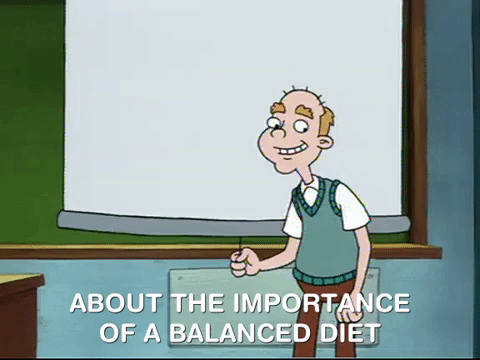- Snowy Mountains
- Posts
- 😀5 Shocking Nutrition and Healthy Eating Myths Busted
😀5 Shocking Nutrition and Healthy Eating Myths Busted
Are You Falling for These Common Nutrition Myths?

Think you know everything about nutrition and healthy eating? Think again! Despite all the information out there, many myths still circulate, leading to confusion and sometimes poor dietary choices. Get ready to have your mind blown as we debunk 10 common myths that might be holding you back from achieving your health and wellness goals!
Watch this video on our socials. Stay tuned for more updates on what's to come! Like & follow our content to keep us going!
Are You Falling for These Common Nutrition Myths?
We live in an age where information is at our fingertips, yet myths about nutrition and healthy eating persist. How many times have you heard that eating fat makes you fat or that you should avoid carbs like the plague? It's time to set the record straight and help you make informed decisions for a healthier, happier life.
Why This Matters to You?
Knowing the truth behind these myths is crucial for anyone on a weight loss plan, aiming for a healthy diet, or trying to figure out how to slim down. By debunking these myths, we empower you to make better choices and achieve your health goals more effectively.
Myth 1: Eating Fat Makes You Fat
Fat has long been demonized as the enemy of a healthy diet, but the truth is more nuanced.
Not all fats are created equal. Healthy fats, like those found in avocados, nuts, and olive oil, are essential for bodily functions and can actually help you lose weight by keeping you full longer.
Consider the Mediterranean diet, which is high in healthy fats. Studies have shown that people who follow this diet have lower rates of heart disease and obesity. For instance, a study published in the New England Journal of Medicine in 2013 found that participants on a Mediterranean diet supplemented with extra-virgin olive oil or nuts had a 30% lower risk of major cardiovascular events compared to those on a low-fat diet. Additionally, a review published in the American Journal of Clinical Nutrition in 2018 concluded that adherence to the Mediterranean diet was associated with a 15% reduction in the risk of obesity.
Myth 2: Carbs Are the Enemy
Carbs have been unfairly blamed for weight gain, but they're not all bad.
Carbohydrates are a primary source of energy for the body. Whole grains, fruits, and vegetables provide essential nutrients and should not be eliminated from your diet.
Look at the diets of top athletes. Many of them consume a balanced amount of carbs to fuel their intense training sessions and maintain peak performance. For example, Olympic swimmer Michael Phelps consumed about 12,000 calories a day during training, with a significant portion coming from carbs like pasta and bread. Similarly, marathon runners often consume between 7-10 grams of carbohydrates per kilogram of body weight per day in the days leading up to a race to ensure their glycogen stores are maximized .
According to a study published in the Journal of the International Society of Sports Nutrition, athletes who maintain a high carbohydrate intake tend to perform better in endurance sports. The study found that endurance athletes who consumed 60-70% of their daily calories from carbohydrates were able to maintain higher energy levels and perform better in long-duration events compared to those on low-carb diets.
Furthermore, a review in Sports Medicine highlighted that carbohydrate intake is critical for high-intensity performance and recovery. The review suggests that consuming 30-60 grams of carbohydrates per hour during prolonged exercise can enhance performance and delay fatigue .
Myth 3: You Need to Detox Regularly
Detox diets and cleanses are all the rage, but are they really necessary?
Your body is naturally equipped with organs like the liver and kidneys to detoxify itself. Extreme detox diets can do more harm than good by depriving your body of essential nutrients.
Consider the case of Sarah, who tried a juice cleanse for a week. By the fourth day, she felt weak and dizzy, symptoms that are common among those who undertake extreme detox diets. Studies have shown that such diets often lead to short-term weight loss due to severe calorie restriction, but the weight is usually regained once normal eating habits are resumed.
According to a study published in the journal Appetite, participants who followed a low-calorie juice cleanse reported significant fatigue and decreased cognitive function. The study concluded that while participants lost weight initially, their metabolism slowed down, and they experienced a loss of muscle mass.
Instead, a balanced diet rich in fruits, vegetables, whole grains, and lean proteins can support your body's natural detox processes. The Centers for Disease Control and Prevention (CDC) emphasizes that a varied diet provides essential vitamins, minerals, and antioxidants that aid in detoxification. For example, cruciferous vegetables like broccoli and Brussels sprouts contain compounds that support liver detoxification enzymes.

Myth 4. Myth: Skipping Meals Helps You Lose Weight
Skipping meals might seem like a quick way to cut calories, but it can backfire.
Skipping meals can slow down your metabolism and lead to overeating later in the day. It’s better to eat smaller, balanced meals throughout the day to keep your metabolism active.
Consider people who skip breakfast and find themselves snacking uncontrollably by mid-morning. Studies show that regular meal patterns help maintain a healthy weight.
Myth 5: All Calories Are Created Equal
A calorie is just a calorie, right? Not so fast.
The source of your calories matters. 200 calories from a candy bar will affect your body differently than 200 calories from a serving of almonds. Nutrient-dense foods provide more than just energy – they offer essential vitamins and minerals.
Consider people who skip breakfast and find themselves snacking uncontrollably by mid-morning. According to a study published in the American Journal of Clinical Nutrition, individuals who regularly skipped breakfast were 4.5 times more likely to be obese than those who ate a healthy breakfast. Another study from the National Weight Control Registry found that 78% of successful dieters, those who lost and maintained at least 30 pounds for a year or more, reported eating breakfast daily.
Data from a 2017 study in the Journal of Nutrition shows that breakfast skippers consumed more added sugars, fewer fruits and vegetables, and were more likely to have higher body mass indices (BMIs) compared to breakfast eaters. Furthermore, regular meal patterns have been linked to improved metabolic health. A study in the journal Obesity found that eating three structured meals per day, as opposed to irregular meal patterns, led to better appetite control and reduced evening snacking.
Conclusion
It's easy to get caught up in the latest diet trends and nutritional myths, but knowledge is power. By understanding and debunking these common myths, you can make informed decisions that truly benefit your health and wellness journey.
We busted myths about fat, carbs, detoxes, meal skipping, and calories. Each of these myths can mislead your efforts to maintain a healthy diet and weight loss plan. Next time you hear a too-good-to-be-true diet tip, remember to question it. Your health is worth the extra research and effort.
Stay tuned for more myth-busting articles and feel free to reach out with any questions or topics you'd like us to cover. Let's continue this journey to better health together!
✨✨Remember, understanding nutrition and making smart choices can significantly impact your health and wellness. Subscribe to our blog for more tips, and don't forget to share this post with friends who might need a little myth-busting in their lives!⭐✨🌟
